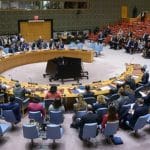The G7 countries, the EU as well as Australia, South Korea, and New Zealand on November 6 expressed “grave concern” over the deployment of North Korean troops to Russia and condemned the increasing cooperation between Pyongyang and Moscow. It is fortunate that in the tense days before the U.S. elections on November 5 Washington actually found sufficient time to deal with this critical issue and agree on a joint statement.
South Korea and Ukraine had earlier revealed that some 10,000 North Korean troops were deployed to Russia. NATO Secretary-General Mark Rutte also confirmed that North Korean troops were already in the Kursk region in what was termed a “dangerous expansion” of the conflict.
The text of the statement was released on November 6, 2024 by the Foreign Ministers of Australia, Canada, France, Germany, Italy, Japan, Republic of Korea, New Zealand, the United Kingdom, the United States and the High Representative of the European Union:
Joint Statement on the DPRK’s Deployment of Troops to Russia
“We, the Foreign Ministers of Australia, Canada, France, Germany, Italy, Japan, Republic of Korea, New Zealand, the United Kingdom, the United States and the High Representative of the European Union express our grave concerns regarding the deployment of DPRK troops to Russia, potentially for the use on the battlefield against Ukraine.
Several thousands of DPRK troops have been deployed to Russia. The DPRK’s direct support for Russia’s war of aggression against Ukraine, besides showing Russia’s desperate efforts to compensate its losses, would mark a dangerous expansion of the conflict, with serious consequences for European and Indo-Pacific peace and security. It would be a further breach of international law, including the most fundamental principles of the UN Charter.
We condemn in the strongest possible terms the increasing military cooperation between the DPRK and Russia, including the DPRK’s export and Russia’s unlawful procurement of DPRK ballistic missiles in breach of multiple UN Security Council resolutions (UNSCRs), as well as Russia’s use of these missiles and munitions against Ukraine. DPRK soldiers receiving or providing any training or other assistance related to the use of ballistic missiles or arms is a direct violation of UN Security Council resolutions 1718, 1874 and 2270. We are also deeply concerned about the potential for any transfer of nuclear or ballistic missile-related technology from Russia to the DPRK in violation of the relevant UNSCRs. We urge the DPRK to stop providing assistance to Russia’s war of aggression.
We reaffirm our unwavering commitment to support Ukraine as it defends its freedom, sovereignty, independence and territorial integrity. We are working with our international partners for a coordinated response to this new development.”








